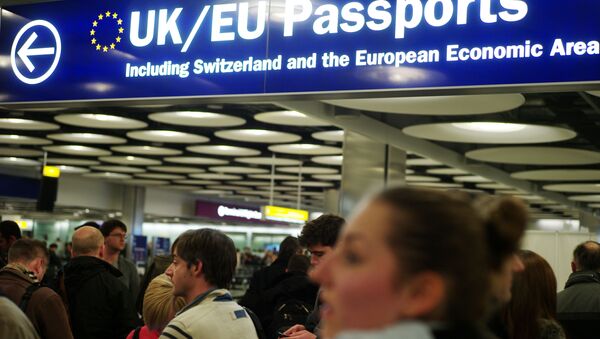In its annual report on immigration to the UK, the Office for National Statistics (ONS) notes overall net EU migration fell slightly to 165,000 in the year to September 2016, with new arrivals from Bulgaria and Romania rising by 19,000 to 74,000, the highest number in a single year yet. This is the first dataset to cover the period following the June 23 Brexit referendum.
Net migration year ending Sept 2016: +165,000 EU citizens, +164,000 non-EU citizens and —56,000 British citizens https://t.co/4GmIwvobe9 pic.twitter.com/3LllHuIwSx
— ONS (@ONS) February 23, 2017
Net migration of non-EU migrants also fell by over 28,000 to 164,000, much of which was driven by a significant decline in the number of foreign students heading to the UK. Moreover, in the three months following the referendum, migrants from many European countries living in the UK fled the country, meaning net migration fell by 49,000 to 273,000. In particular the number of Eastern Europeans leaving the UK rose by almost a third, to 39,000.
Net migration for EU8 citizens decreased 22,000 to 19,000 https://t.co/6vhFQtUF5O https://t.co/HZQ3dZ7Dhc
— ONS (@ONS) February 23, 2017
The figures also document the first fall in asylum applications since 2010, with 38,517 claims lodged, a fall of 1,451 on 2015.
This rise may well be attributable to the demonstrable surge in hate crime and racist rhetoric in the wake of the Brexit vote. The UK Equality and Human Rights Commission has expressed concern about this increase, and campaigner Gina Miller previously told Sputnik the mainstream media in the UK "stopped reporting news, and became political propaganda rags" following the plebiscite.
Nonetheless, Nicola White, ONS head of International Migration Statistics, said that there have been continued increases in immigration from Romania and Bulgaria, and it's thus too early to say what effect the referendum result may have had on long-term international migration.
"There has been a statistically significant decrease in non-EU long-term students immigrating to the UK while a small increase was seen in the number of study visas issued. It is too early to tell if this is an indication of a long-term trend," White added.
Elsewhere, figures suggest the number of EU nationals in Britain, who had UK residency applications processed post-Brexit, more than doubled, from 92,289 in 2015 to 201,287 in 2016. Over 140,000 were successful, while over 40,000 were refused, and around 19,000 were judged invalid. Measures are being undertaken to simplify the process, as applying for British residency has ceased to be a "niche" activity, officials have said.
294,000 people immigrated to work YE Sept 2016; of these 65% had a definite job to go to (highest estimate recorded) https://t.co/4GmIwvobe9 pic.twitter.com/vGKf1sQdNC
— ONS (@ONS) February 23, 2017
Employment remains the primary driver for immigration to the UK, with 180,000 EU citizens coming to Britain to work in the year to September. Some 190,000 migrants — 65 percent of the total, the highest ever — had a definite job to go to. Just over 104,000 came to look for work.
Immigration Minister Robert Goodwill tentatively welcomed the figures despite the ONS' own caution, saying the fall was "encouraging."
"We will continue reforming routes to the UK from outside Europe and will use the opportunity to take control of immigration from within the EU as we begin Brexit negotiations in the coming weeks. The UK will always welcome those who contribute and benefit our country, but there is no consent for uncontrolled immigration," he added.



